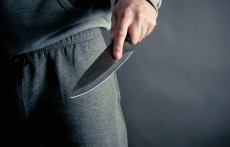Are NYC Stabbings the Result of Gun Control?
 Knife attacks are on the rise in New York City. In January and February alone, the NYPD reported some 567 knife attacks, a full 20 percent higher than during the same period in 2014.
Knife attacks are on the rise in New York City. In January and February alone, the NYPD reported some 567 knife attacks, a full 20 percent higher than during the same period in 2014.
Despite the sharp jump in stabbings, it’s reported that neither police, nor criminologists have been able to discern a pattern. Attackers have carried boxcutters. One woman in the Bronx was attacked with a machete. Yet another woman, a 71 year-old, was slashed in the face with a razor blade while riding the subway. Victims range in age, race, and gender. The attacks have occurred in tourist areas as well as other parts of the city.
Despite a lack of consensus regarding the cause of the knife attacks, several hypotheses have been put forward. In an interview, John Lott, the president of the Crime Prevention Center claimed, commented on the string of stabbings in subways. “It’s possible criminals just realized it was easier to commit crimes on the subways,” he said. “You may simply have a copycat effect.”
Bill de Blasio, New York’s mayor, has his own theory as to why knife violence has increased. In responding to questions about the attacks, he told reporters that the NYPD’s crackdown on firearms might be to blame.
There’s something bigger going on here and I think this is really worthy of examination by the media. NYPD has driven down violent crime now for almost a quarter-century and increasingly they are getting at the supply of guns…I’m not a criminologist, but I can safely say that guns are being taken off the street in an unprecedented way. Some people, unfortunately, are turning to a different weapon – thank God, typically, a less deadly weapon but they’re turning to a different weapon.
Critics were quick to push back. In an interview with Fox News, former NYPD Detective Scott Prendergast stated that, “these criminals didn’t just start carrying knives out of the blue because of the guns getting taken—I don’t believe that for a second.” He proceeded to blame the attacks on the ending of another controversial policy—“stop-and-frisk.”
This may be the first time (last?) in my life I agree with Bill de Blasio about a policy issue. While there may be other factors contributing to the rise in knife related crime, his assessment that criminals may “turning to different weapons,” makes sense.
It all comes down to basic economics. People respond to costs and benefits. If the expected benefit of an activity is greater than the expect cost, we’d expect a person to undertake that activity. On the other hand, if the cost is greater than the benefit, we’d expect them to forgo said action. This reasoning applies to all decision making, whether it’s eating another cookie, getting an extra hour of sleep by hitting the snooze button, or deciding to commit a crime with a gun or a knife. If guns become more difficult to obtain, the penalty for being caught with a gun increases, etc., knives are likely to look much more appealing by comparison.
What does the data tell us? Does de Blasio’s statement hold empirically? Well, it’s difficult to look at the United States for an example as citizens are allowed to own firearms per their 2nd Amendment right. But we can look at other places, like the UK.
Great Britain’s gun ban is frequently held up as a model that U.S. lawmakers may emulate to curtail shootings in the United States. It’s interesting to note, however, that with stricter laws on guns in place in the country, the UK has a substantial amount of knife crime. The country saw a sharp (no pun intended) increase in knife violence over the past couple years. Knife crime increased some 13 percent between 2014 and 2015 alone. In fact, the rate of knife violence in the United Kingdom is now double the rate of gun violence in the United States! The government has now implemented a program to confiscate knives. “Save a life,” the slogan says, “surrender your knife.” Unfortunately, knife violence increased following the implementation of the program. Sexual assaults with knives rose by 28 percent between 2014 and 2015 and general assaults with knives increased by 13 percent over the same period.
We can all hope that the rise in knife attacks in NYC comes to an end. Although many are quick to dismiss his claims, we need to give credit where credit is due. Bill de Blasio’s ideas have a basis in standard economic theory and they appear to by empirically supported with the data available. Whether knife violence is “better” than gun violence is a matter of personal opinion. What we can say, however, is that attempting to end one form of violence by banning it will likely only result in different kinds of violence as opposed to less violence overall. If Great Britain is to serve as a model, we may see violent crime with other weapons increase.





